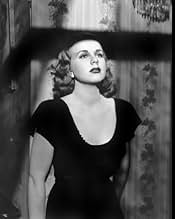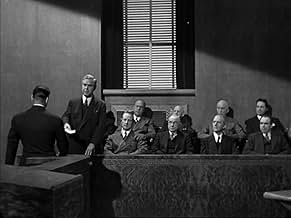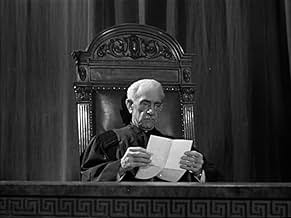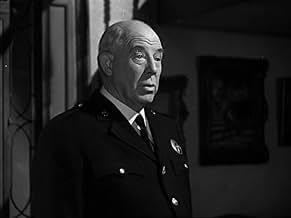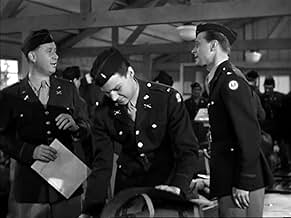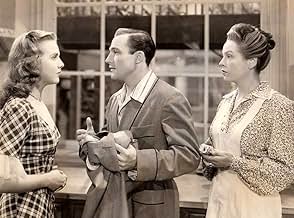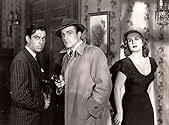IMDb रेटिंग
6.5/10
1.8 हज़ार
आपकी रेटिंग
अपनी भाषा में प्लॉट जोड़ेंA young femme-fatale realizes that the man she married is an incorrigible wastrel.A young femme-fatale realizes that the man she married is an incorrigible wastrel.A young femme-fatale realizes that the man she married is an incorrigible wastrel.
- निर्देशक
- लेखक
- स्टार
- 1 ऑस्कर के लिए नामांकित
- कुल 1 नामांकन
Eddie Acuff
- Steve
- (बिना क्रेडिट के)
Fred Aldrich
- Bartender
- (बिना क्रेडिट के)
Frank Austin
- Jury Member
- (बिना क्रेडिट के)
John Barton
- Concertgoer
- (बिना क्रेडिट के)
Vangie Beilby
- Wedding Guest
- (बिना क्रेडिट के)
John Berkes
- Waiter
- (बिना क्रेडिट के)
Oliver Blake
- Defense Attorney
- (बिना क्रेडिट के)
Charles Cane
- Joe
- (बिना क्रेडिट के)
Wheaton Chambers
- Plane Passenger
- (बिना क्रेडिट के)
Ruth Cherrington
- Concertgoer
- (बिना क्रेडिट के)
James Conaty
- Concert Patron
- (बिना क्रेडिट के)
फ़ीचर्ड समीक्षाएं
"Christmas Holiday" (Universal, 1944), directed by Robert Siodmak, is an interesting drama with "film noir" elements, (based on the story by W. Somerset Maugham which changes the local from Paris to New Orleans), starring two performers long associated with musical-comedy, Deanna Durbin and Gene Kelly (on loan from MGM), in their only film together. Deanna Durbin's long awaited dramatic role, with two songs thrown in for good measure, might have earned her an Academy Award nomination, but didn't. Due to its lack of television revivals during the last couple of decades, "Christmas Holiday" just remains only a memory to anyone who has any recollection of ever seeing it.
The story begins with Lieutenant Charlie Mason (Dean Harens) about to have Christmas leave from military service to return home and marry his fiancée, Mona, but he receives a letter written by her that reads that she has married someone else. When his plane lands in New Orleans due to a bad rainstorm, Mason, quite depressed, makes the acquaintance with Simon Fenimore (Richard Whorf), a reporter, who invites him to accompany him to a night club managed by Valerie De Merone (Gladys George). While there, Mason meets Jackie Lamont, a night club singer (Deanna Durbin), and after she finishes vocalizing, "Spring Will Be a Little Late This Year," Jackie has Mason accompany her to a church. During the Mass, she starts to break down and cry. Mason covers up by placing his coat over her. He then escorts this troubled girl to a diner where she tells him her story: (Flashbacks reveal Jackie to be Abigail Martin. She meets Robert Manette (Gene Kelly). They fall in love and are soon married. Their marriage is happy and blissful for six months until Abigail learns that her husband, a troubled gambler, has just murdered his bookmaker. Abigail goes through a series of unpleasant circumstances during her husband's trial, especially when Robert's domineering mother (Gale Sondergaard) gives her a hard slap across her face for not having been a stronger influence on him after her son is found guilty and sentenced to serve time in prison.) Forwarding to the present: Abigail finishes her revealing story to Mason. She later learns that Robert has escaped from prison and is out to get her, adding more to her troubles.
When I first saw "Christmas Holiday" in one of its very rare television presentations on a PBS channel in 1982, I was moved by it and Durbin's performance from start to finish, and have never forgotten it. Possibly watching this movie again after so many years, I would not have that same reaction I had the first time, but otherwise, it still brings a new kind of experience in seeing Durbin in a serious role, that shouldn't go unnoticed. Durbin sings two songs, "Spring Will Be a Little Late This Year," and her lovely rendition to Irving Berlin's "Always." I was even surprised to find Gene Kelly playing a role against type. Still new to movies (making his debut in 1942), his dramatic acting comes off somewhat awkward. I've seen Kelly act in other serious roles, some good, some not, but his character in this production is definitely unsympathetic. He even gets a chance to carry a gun and use it in a shoot out. No dancing for him here unless he's dodging bullets bouncing from the floor. As for Gale Sondergaard, she looks too young to be playing Kelly's mother, a role that would have been far better suited to the likes of Margaret Wycherly (best remembered for her gangster mother role in James Cagney's in "White Heat" (1949)), but Sondergaard doesn't disappoint with her domineering performance over her "Momma's boy."
Also seen in the supporting cast is Universal contract player, David Bruce playing Gerald Tyler. Bruce would soon be elevated to Durbin's co-star in her only Technicolor musical, CAN'T HELP SINGING (1944).
Yes,"Christmas Holiday" is a rare find indeed, a different kind of Christmas story, the one that doesn't get to be added in the package of other Christmas movies that air annually on television, including all versions to "A Christmas Carol" (1938), "It's a Wonderful Life" (1946) and/or "Miracle on 34th Street" (1947). While this movie has never been presented on classic cable channels like American Movie Classics, it's currently available (as of 2006) in the VHS format and can be purchased through Movies Unlimited. I recommend seeing it, at least once, if not for its dramatic content, but for its casting. (***)
The story begins with Lieutenant Charlie Mason (Dean Harens) about to have Christmas leave from military service to return home and marry his fiancée, Mona, but he receives a letter written by her that reads that she has married someone else. When his plane lands in New Orleans due to a bad rainstorm, Mason, quite depressed, makes the acquaintance with Simon Fenimore (Richard Whorf), a reporter, who invites him to accompany him to a night club managed by Valerie De Merone (Gladys George). While there, Mason meets Jackie Lamont, a night club singer (Deanna Durbin), and after she finishes vocalizing, "Spring Will Be a Little Late This Year," Jackie has Mason accompany her to a church. During the Mass, she starts to break down and cry. Mason covers up by placing his coat over her. He then escorts this troubled girl to a diner where she tells him her story: (Flashbacks reveal Jackie to be Abigail Martin. She meets Robert Manette (Gene Kelly). They fall in love and are soon married. Their marriage is happy and blissful for six months until Abigail learns that her husband, a troubled gambler, has just murdered his bookmaker. Abigail goes through a series of unpleasant circumstances during her husband's trial, especially when Robert's domineering mother (Gale Sondergaard) gives her a hard slap across her face for not having been a stronger influence on him after her son is found guilty and sentenced to serve time in prison.) Forwarding to the present: Abigail finishes her revealing story to Mason. She later learns that Robert has escaped from prison and is out to get her, adding more to her troubles.
When I first saw "Christmas Holiday" in one of its very rare television presentations on a PBS channel in 1982, I was moved by it and Durbin's performance from start to finish, and have never forgotten it. Possibly watching this movie again after so many years, I would not have that same reaction I had the first time, but otherwise, it still brings a new kind of experience in seeing Durbin in a serious role, that shouldn't go unnoticed. Durbin sings two songs, "Spring Will Be a Little Late This Year," and her lovely rendition to Irving Berlin's "Always." I was even surprised to find Gene Kelly playing a role against type. Still new to movies (making his debut in 1942), his dramatic acting comes off somewhat awkward. I've seen Kelly act in other serious roles, some good, some not, but his character in this production is definitely unsympathetic. He even gets a chance to carry a gun and use it in a shoot out. No dancing for him here unless he's dodging bullets bouncing from the floor. As for Gale Sondergaard, she looks too young to be playing Kelly's mother, a role that would have been far better suited to the likes of Margaret Wycherly (best remembered for her gangster mother role in James Cagney's in "White Heat" (1949)), but Sondergaard doesn't disappoint with her domineering performance over her "Momma's boy."
Also seen in the supporting cast is Universal contract player, David Bruce playing Gerald Tyler. Bruce would soon be elevated to Durbin's co-star in her only Technicolor musical, CAN'T HELP SINGING (1944).
Yes,"Christmas Holiday" is a rare find indeed, a different kind of Christmas story, the one that doesn't get to be added in the package of other Christmas movies that air annually on television, including all versions to "A Christmas Carol" (1938), "It's a Wonderful Life" (1946) and/or "Miracle on 34th Street" (1947). While this movie has never been presented on classic cable channels like American Movie Classics, it's currently available (as of 2006) in the VHS format and can be purchased through Movies Unlimited. I recommend seeing it, at least once, if not for its dramatic content, but for its casting. (***)
If you want to see a film version of Somerset Maugham's "Christmas Holiday", you'll have to wait a while. This isn't it, despite the credit. "Suggested by..." would have been a more accurate credit. Maugham's tale is set in prewar Paris and concerns a young English college student who goes to Paris to see the sights during his Christmas vacation. This film updates the action to WW2 and concerns a lieutenant just graduated from flight school on leave to get married in San Francisco. Grounded by bad weather in New Orleans, he receives a telegram from his fiancée announcing her marriage to some other cluck. He decides to continue to S.F., presumably bent on vengeance. From here on film and Maugham more less parallel each other in broad outline, but all of Maugham's discussions between the student and his radical journalist friend about politics, sex, society and other more or less tabu topics in 1944 Hollywood are eliminated. In the film, the journalist is a pestiferous, drunken ne'er-do-well who frequently acts as a pimp for Gladys' dive. In the original story, Deanna's character, named Sonya, is a Russian émigré forced into prostitution to support herself and her sociopathic lover. Stripped of all of Maugham's philosophical thrust, we have just another film-noir/weeper, although it's not too bad in many respects. Not to reveal the melodramatic denouement tacked on by Hollywood, I'll only say that Maugham's story ends without any resolution, except possibly the student's regret that after being introduced to Sonya, he didn't see Paris, and all he got out of Sonya was conversation. In that, film and story agree.
Well, there you are! Somerset Maugham's "Christmas Holiday" indeed! But it's not as bad as some critics declare. Pauline Kael didn't like it, of course. But it is interesting as a film noir, and Deanna's first, perhaps only real, chance at a dramatic vehicle. Helen Hayes, or even Jane Greer, she wasn't, but then it's doubtful that Universal ever made any effort to develop her acting talent beyond the merest fundamentals. Also she didn't have the long film background of a Helen Parrish. She does present a winsome, sympathetic girl plunged into bad circumstances when her attractive husband proves a murderer and general bad type. Added to that, her mother-in-law casts her out after the husband's conviction. It's not a great performance, but Hollywood has produced many worse. Gene Kelly and the rest of the cast are very good. Kelly is in a very early role, the others are mostly veterans. It's a very moody piece, with photography to suit, and not at all what you would have gotten if Maugham's real story had been filmed.
Oh, yes. Deanna gets to sing two songs. Early on we get "Spring will be a little late this year", which is a slightly jazzy torch song, and later in the film, "Always", beautifully and wistfully delivered by Deann.
Well, there you are! Somerset Maugham's "Christmas Holiday" indeed! But it's not as bad as some critics declare. Pauline Kael didn't like it, of course. But it is interesting as a film noir, and Deanna's first, perhaps only real, chance at a dramatic vehicle. Helen Hayes, or even Jane Greer, she wasn't, but then it's doubtful that Universal ever made any effort to develop her acting talent beyond the merest fundamentals. Also she didn't have the long film background of a Helen Parrish. She does present a winsome, sympathetic girl plunged into bad circumstances when her attractive husband proves a murderer and general bad type. Added to that, her mother-in-law casts her out after the husband's conviction. It's not a great performance, but Hollywood has produced many worse. Gene Kelly and the rest of the cast are very good. Kelly is in a very early role, the others are mostly veterans. It's a very moody piece, with photography to suit, and not at all what you would have gotten if Maugham's real story had been filmed.
Oh, yes. Deanna gets to sing two songs. Early on we get "Spring will be a little late this year", which is a slightly jazzy torch song, and later in the film, "Always", beautifully and wistfully delivered by Deann.
A nice film--and it is nice to see Deanna Durbin shed her little girl image for something with a bit of a bite to it. She plays a singer in a nightclub and is married to Gene Kelly, although he doesn't have much to do in this film. Nice to see some good supporting performances by Gladys George and Gale Sondergaard--although Ms. Sondergaard seems a bit young to play Gene Kelly's mother!!
The two stars are Deanna Durbin and Gene Kelly so 1940's audiences seeing a title like "Christmas Holiday" may well have expected a musical. The surprise was a TKO, and people reeled under this somewhat cleansed version of the Maugham novel. A powerful drama, "Christmas Holiday" actually proves that Durbin could have been on the verge of a stellar adult career that would have included important dramatic roles. She is merely superb in this one as a 'dance hall singer-hostess' who is determined to suffer as much as her murderous, jailed, asocial husband, very well done here by Gene Kelly. Durbin sings two standards beautifully, but it is her ACTING here that boosts the attention. Robert Siodmak, one of our finest noir-ish directors, carries off this challenge with excellence. Dean Harens is an fine foil for Durbin in her quest for retribution. A Broadway actor, he sounds and acts in the Tom Drake-style, and that is a compliment. Gladys George, Gale Sondergaard, Richard Whorf work well under Siodmak. Perhaps the public wasn't ready for Durbin and Kelly as 'hostess' and 'psycopath', and that is a shame. Despite the whitewash of some of the novel's elements, this is a very very fine film, and Deanna Durbin, wherever you may be these days, you are to be sincerely commended. Thanks for this one!!
Hmmm, I wonder of Tennessee Williams saw this in 1945 and wrote SUDDENLY LAST SUMMER as a riff on this astonishing incestuous masochistic noir. Universal's 1944 "Christmas Holiday"is a startling dark film that is quite explicit in its adult themes of prostitution, self punishment, sexual manipulation, incest and some quite twisted emotional ideas. It even has scenes similar to that same 1959 Taylor Montgomery Hepburn drama. Cleverly, Universal cast music stars Gene Kelly as the handsome spoiled son with the demon mother (Gale Sondergaard) and cherubic Deanna Durbin as the adoring slavish young woman that Mother encourages he marries to keep his amoral unethical character in check. The idea that Mother enthusiastically endorses their marriage so she can control both of them by their sexual desire for each other is a rank idea as slimy as seen in the pre code shocker THE SILVER CORD. I personally found the film riveting and I very much liked the casting against type. For me it gave the film excellent surprise value. Kelly made a terrific seductive rat. Durbin's slide into willing prostitution to 'be with him' in a decadent lifestyle (while he was away) is a great downbeat storyline. Everything about "Christmas Holiday" is deceptive, right from the happy title to the handsome horror of Kelly's character. I will not spoil the story for you other than to say the whole film is a terrific ride, and with a ripe explicit tone, you will be seduced yourself. Plenty of flashback like SORRY WRONG NUMBER and equally as creepy. What a surprise! Hilariously, in Australia it was our Nationwide TV treat at 8.30pm on Christmas night! Haven't our TV programmers got a sly sense of humor.
क्या आपको पता है
- ट्रिवियाBecause of the Hays Code, screenwriter Herman J. Mankiewicz changed the setting from a Paris brothel to a nightclub in New Orleans, and changed the main character from a prostitute to a more ambiguous nightclub singer and hostess, in adapting the 1939 novel of the same name by W. Somerset Maugham.
- गूफ़After Robert breaks out of jail, the newspaper spells his last name as "Mannette". However, the correct spelling is "Manette".
- भाव
Simon Fenimore: [to Charles] The planes are all grounded, the trains won't do you any good, and you're too big for me to carry on piggyback.
- कनेक्शनReferenced in Go, Johnny, Go! (1959)
टॉप पसंद
रेटिंग देने के लिए साइन-इन करें और वैयक्तिकृत सुझावों के लिए वॉचलिस्ट करें
- How long is Christmas Holiday?Alexa द्वारा संचालित
विवरण
- रिलीज़ की तारीख़
- कंट्री ऑफ़ ओरिजिन
- भाषा
- इस रूप में भी जाना जाता है
- W. Somerset Maugham's Christmas Holiday
- फ़िल्माने की जगहें
- St Vibiana RC cathedral, Main St, लॉस एंजेल्स, कैलिफोर्निया, संयुक्त राज्य अमेरिका(midnight mass scene)
- उत्पादन कंपनी
- IMDbPro पर और कंपनी क्रेडिट देखें
- चलने की अवधि1 घंटा 33 मिनट
- रंग
- पक्ष अनुपात
- 1.37 : 1
इस पेज में योगदान दें
किसी बदलाव का सुझाव दें या अनुपलब्ध कॉन्टेंट जोड़ें



